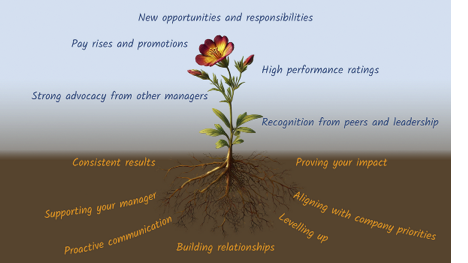Why your score is decided months before the meeting — and how to ensure you come out on top.
How many months until your company’s next performance review starts?
Wrong. It’s already started.
Performance review scores aren’t decided during a quick, four-week process in the middle of the year. They happen gradually, then suddenly.
Months before the official review process even begins, your company is already allocating budgets for pay rises and promotions. This sets the stage for what’s possible during review season.
At the same time, your manager starts paying closer attention — watching who’s consistently delivering value, who’s coasting, and who’s going above and beyond.
By the time the review process officially kicks off, most of the critical decisions are already made.
 Your manager doesn’t work in isolation either. They’ll discuss your rating with other managers to validate their perspective. This group discussion can make or break your score. Managers naturally advocate for their own people and will only support others who’ve made their lives easier or proven their value across the organisation.
Your manager doesn’t work in isolation either. They’ll discuss your rating with other managers to validate their perspective. This group discussion can make or break your score. Managers naturally advocate for their own people and will only support others who’ve made their lives easier or proven their value across the organisation.
What you cultivate over months shapes your future success.
Gradually, then suddenly
Your performance, results, and reputation build over time — project by project, meeting by meeting, interaction by interaction. Then, in one final moment, those impressions are locked in, and your score is set.
By the time you sit down with your manager for the review discussion, your fate is sealed.
If your plan is to charm your way to a better score, a bigger pay rise, or a promotion with pleas or a lengthy, compelling document, you’ll likely be disappointed. It’s already too late.
So, how do you ensure you’re at the top when it matters most?
Start Now
Here are six actionable steps to set yourself up for success:
1. Focus on the work that matters
Make sure your efforts align with the company’s priorities. Deliver results that directly contribute to the organisation’s goals.
2. Keep your manager in the loop
Be transparent about your career goals — whether it’s aiming for a higher score, a pay rise, or a promotion. Make sure they know what you’re working on and why.
3. Prove your impact
Consistently show how your work goes above and beyond your current responsibilities. Document key wins and outcomes so they’re easy to share when needed.
4. Ask how you can help
Take the initiative to ask your manager how you can support their goals. When you align with their priorities, you demonstrate teamwork and strategic thinking.
5. Build your reputation
Forge strong relationships with other teams and managers. Their opinions could influence your rating during cross-team discussions.
6. Level up
Study the expectations for the next step in your career ladder. Where possible, start operating at that level now to show you’re ready for more responsibility.
Performance reviews are earned over time
Performance reviews aren’t about what happens in the room. They’re about everything you’ve done in the months leading up to it. Long-term consistency — not last-minute efforts — wins the day.
By focusing on meaningful work, proving your value, and building a strong reputation, you set yourself up for the best possible outcome.



